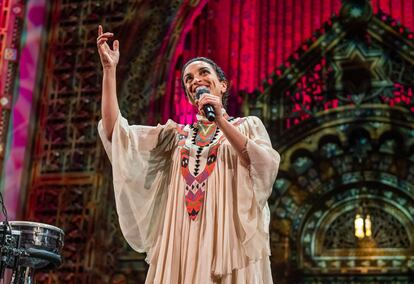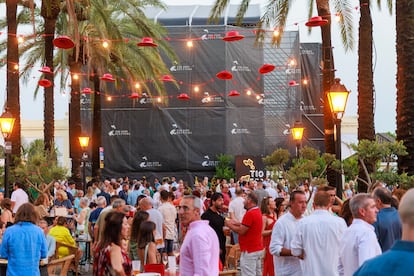Noa: ‘Israel has been kidnapped by a gang of corrupt politicians’
The performer talks to EL PAÍS about the mass protests against Prime Minister Benjamin Netanyahu’s judicial reform, her love of flamenco and her upcoming concert in Spain

Noa — born Achinoam Nini — is a singer with a powerful voice. Influenced by jazz and flamenco, the 54-year-old singer has been tied to Spain and its culture since her artistic career began three decades ago.
“Perhaps it’s [because of my] Sephardic roots, which are so deep here? Maybe it’s all the incredible Spanish literature, poetry, music and art that have inspired me? Or the love that I’ve felt from the Spanish public from the first day of my career until today? Or all the friends I’ve made? Of course, collaborations with great artists are a big part [of this connection], but I feel like it goes way beyond that. I’ve had a love story with Spain, with all the complexity and ups and downs that a deep, long and intense relationship entails,” she explains to EL PAÍS.
Thus begins an interview with this singer of Sephardic origins, who is so popular in Spain. On August 14, she’ll be performing at the Tío Pepe Music Festival in Jerez de la Frontera and, on August 20, at the Starlite Music Festival in Marbella. While she’s keen to talk about music, the conversation inevitably delves into the social and political issues plaguing Israel, which has seen massive demonstrations since July. Protests are being held against Prime Minister Benjamin Netanyahu’s judicial reform, which compromises the impartiality of judges and has been interpreted as an attack on democracy and the separation of powers.
Noa has called on Spain for support: “I am appealing to the Spanish Royal Household, the government of this country and the Spanish people to support the Israeli people who are fighting for democracy, equality and freedom, and avoid this evil, dishonest and dangerous government, which is threatening our very existence. Let them know your opinion: there are many ways to do it. We need you, Spain,” she pleads to EL PAÍS via email, shortly before her trip to Jerez de la Frontera.
This is, without a doubt, her longest and most emphatic answer. The singer has never abstained from positioning herself politically: she has spoken out against the end of the Israeli-Palestinian conflict. “Israel is facing the worst crisis in its history. Our country has been hijacked by a gang of corrupt politicians. Some — like Netanyahu — are desperate to avoid prosecution for crimes they have been accused of by the very state they dishonestly claim to serve and lead ‘fairly,’ [while others are] criminals, extremists, supporters of terrorism, messianizing fanatics and opportunists. They came to power democratically by a slim margin, but have been hell-bent on destroying our democracy ever since,” she writes harshly. “The so-called judicial reform presented by this ultra-right, ultra-nationalist, religious and fanatical coalition is nothing more than a dictatorship’s coup. If carried out, it will lead to Israel’s demise.”

Noa’s eclectic style — aimed at cultivating an audience in the international musical heritage, but without renouncing popular culture — is impossible to fit into a genre. “I always refer to Duke Ellington when they ask me about this. He said that there are only two types of music: the good and the rest.”
The singer — who has actively participated in the recent protests by “marching, singing, speaking, writing, raising my voice, as I have done for years for the causes I believe in” — is excited after the spectacular popular reaction to the measure adopted by the government. “The public uprising is massive and inspiring! My broken heart fills with hope when I see the power of the people. I truly hope that this crisis, once resolved, will lead to a profound rethinking of the essence and values of our country.”
“When we get rid of this wicked government, [we must] solidify and strengthen our democracy with the constitution we lack; we must end the occupation of the Palestinian people, establish a state alongside our own, work tirelessly for peace with all our neighbors and redress the deep-rooted inequality in our society. It’s not impossible, but we need help from our friends, including Spain,” she emphasizes.
With this combative attitude — firm but serene and “loaded with love” — Noa arrives in Spain on Monday, within the framework of a highly original festival that is held in the centuries-old González Byass winery in the city of Cádiz. With this appearance, the singer of Yemeni descent will join the long list of great international names who have performed there, from a living legend such as Tom Jones to classic American musicians Ben Harper and Pat Metheny.
It might seem that Noa is holding a concert that invites some nostalgia. Or, at least, it looks back on her career, with the title “The best of Noa.” However, the Yemeni artist is surprised by this consideration: “Honestly, I don’t have such a romantic idea of this recital in mind. I’m not nostalgic and I don’t waste time looking back, either. I’m a woman of the present: simply, I love what I do, and I do what I love.”,
With her voice — tuned to instrumental perfection — she will sing well-known jazz standards during her two Spanish dates. She will also pay tribute to Johann Sebastian Bach, whom she dedicated one of her latest albums to: Beautiful That Way. “Of course, I’m going to sing in Spanish,” she assures EL PAÍS. In the past, she has sung the Spanish version with the legendary Panamanian singer, Miguel Bosé.
There will also be a space dedicated to the immortal pieces of jazz, which are brought together in her album Afterallogy. She will sing classics by artists from days past, such as My Funny Valentine, Anything Goes and Oh, Lord, which will be played in the Jerez winery’s Patio de la Tonelería — a space that stands in what has been the center of the town since 1835.
“I have had some of the most intense, difficult and beautiful experiences of my life on this earth, so I’m deeply grateful, but also excited to be here,” says Noa, who considers herself indebted to flamenco, which was a fundamental part of her musical education. “I learned a lot about Andalusia from artists I have listened to for years, like Camarón de la Isla, Lole y Manuel and many others. I adore flamenco,” the artist proclaims. She peppers her conversation with names such as Miguel Poveda, Marina Heredia, David Peña Dorantes and Pasión Vega — all related to Andalusia and flamenco. Noa also mentions Cristina Heeren — a well-known American, settled in the Andalusian capital — who leads a foundation dedicated to studying the art of flamenco. “I visit her a lot in Seville: she’s my flamenco godmother.”
Noa returns to Spain with her inseparable guitarist, Gil Dor — a composer and producer who has accompanied her since she began her career. “It’s been 30 years since we met, but we haven’t stopped learning together. We’re still good friends. Now, we’re doing a lot of spontaneous songwriting — a unique kind of improvisation in real time, freestyle, a stream of consciousness that’s very exciting,” she explains.
The Tío Pepe Festival: music inside a winery
Unlike other similar festivals aimed at wealthy, older audiences, the festival where Noa will be performing on Monday offers a broader cultural experience. In addition to music, it will focus on gastronomy and the dissemination of wine culture. It’s a boutique festival, or, at least, that’s what director Beatriz Vergara believes. She also leads the tourism division of the González Byass winery. “We prefer to call it ‘unique.’ Unlike other festivals — which find a space and adapt it to [host performances] — we adapt a festival to mount it inside a winery. In this case, one that has nearly two centuries of history. This differentiating element gives us an identity,” Vergara explains.
According to data from the festival, at least 30,000 people will have attended by the time Noa closes it out on Monday. There are two stages: the original one in the Patio de la Tonelería — with capacity for 1,500 people — and a larger location that can host 2,500, in the more modern Bodega Las Copas, owned by the same winery. “We’ve been growing little by little,” Vergara notes proudly. She already has her sights set on the celebration of the 10th anniversary of the festival, scheduled for 2024. “We increased the number of spaces as a result of the pandemic, because we could only offer 70% capacity, until we saw that we could consolidate [everything into two areas], each with a special architecture and concept.”
The boomer generation has become a regular at this type of summer event, which combines concerts with other activities. “Some people come every year because they like the experience and, from there, they choose the concert to go to. Not the other way around,” the director says. Even so, given the configuration of its line-up — where “not only are there very commercial artists, but also big names with proven backgrounds in many genres” — it mainly attracts boomers.
The Tío Pepe Festival completes its musical offering with flamenco dancers, stand-up comedy and an elegant dinner, where González Byass wines are paired with a tasting menu from various Michelin-starred restaurants. There’s also the possibility of staying in the little inn that’s owned by the winery.
Sign up for our weekly newsletter to get more English-language news coverage from EL PAÍS USA Edition
Tu suscripción se está usando en otro dispositivo
¿Quieres añadir otro usuario a tu suscripción?
Si continúas leyendo en este dispositivo, no se podrá leer en el otro.
FlechaTu suscripción se está usando en otro dispositivo y solo puedes acceder a EL PAÍS desde un dispositivo a la vez.
Si quieres compartir tu cuenta, cambia tu suscripción a la modalidad Premium, así podrás añadir otro usuario. Cada uno accederá con su propia cuenta de email, lo que os permitirá personalizar vuestra experiencia en EL PAÍS.
¿Tienes una suscripción de empresa? Accede aquí para contratar más cuentas.
En el caso de no saber quién está usando tu cuenta, te recomendamos cambiar tu contraseña aquí.
Si decides continuar compartiendo tu cuenta, este mensaje se mostrará en tu dispositivo y en el de la otra persona que está usando tu cuenta de forma indefinida, afectando a tu experiencia de lectura. Puedes consultar aquí los términos y condiciones de la suscripción digital.









































